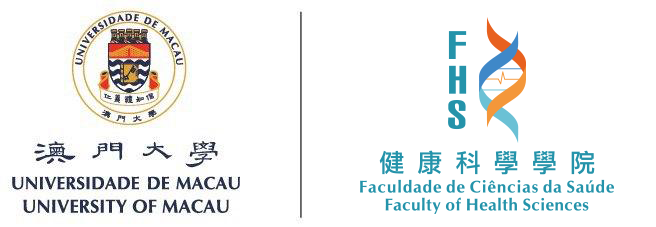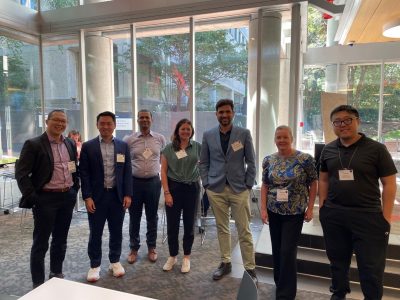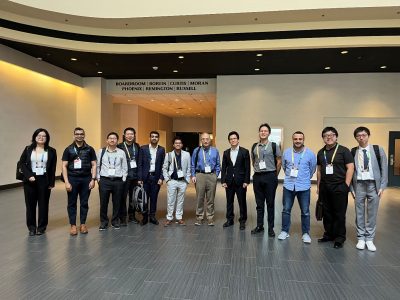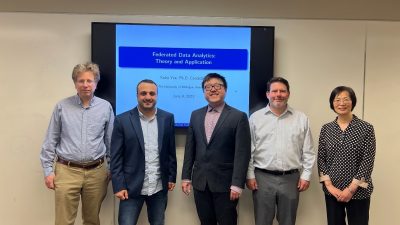Xubo YUE graduated from the University of Macau (UM) Faculty of Health Sciences (FHS) in 2016 with a Bachelor’s degree in Biomedical Sciences. He is currently serving as Assistant Professor in the Department of Mechanical and Industrial Engineering at Northeastern University in the USA, primarily focusing his research in the fields of federated learning, statistics, and optimisation algorithms; and applying these technologies to sectors such as manufacturing and healthcare. His academic development into interdisciplinary and cross academic-industry collaborative work can be traced back to his undergraduate studies at UM.
Seeking Cross-disciplinary Expertise on a Quality Learning Platform
Xubo initially chose to study at UM due to his aspirations for a multi-cultural environment and desire to engage in exchanges with internationally renowned universities. During his time at UM, in addition to majoring in Biomedical Sciences, he also took courses in computer science and mathematics that he found deep interest, and achieved good results in all of them. He is grateful for the guidance of Prof. Yutao XIANG from FHS, Prof. Ying BIAN from Institute of Chinese Medical Science (ICMS), and Prof. Lihu XU from the Faculty of Science and Technology (FST) Department of Mathematics, who methodically taught him the fundamentals of subjects such as biology, mathematical analysis, and computer algorithms. The help from these professors were pivotal in laying a solid theoretical foundation and practical skills for his cross-disciplinary academic research.
He further elaborated that his studies in genetics and pharmacology allowed him to understand the mechanisms of biological processes and drug effects, while mathematical analysis and differential equations provided him with the tools to comprehend and model these complex processes. The learning of computer algorithms further enabled him to effectively process and analyse large-scale data. Although these disciplines may seem unrelated, the knowledge and skills he acquired are actually complementary to each other, collectively forming the foundation of his current research work. “Prof. Xiang’s course on public health made me realise the importance of biostatistics in public health. At the time, I hoped to integrate the precision and rigour of mathematics with the practical applications of biomedical sciences, using biostatistical methods to contribute towards public health development,” he said.
He mentioned that all three professors not only provided him with in-depth guidance in their respective professional fields, but also encouraged him to integrate knowledge from different disciplines and explore new research directions. “Being inspired by them, I realise that innovation often comes from the intersection and integration of different fields,” says Xubo.
Overseas Academic Exchange Broadens Horizons
During his time in UM, he also participated in UM’s overseas exchange programme, becoming an exchange student at University of California, Berkeley. This not only improved his English proficiency and allowed him to bask in the charm of the American education system, and also enhanced his perception of the global research landscape.
Subsequently, Xubo has received offers from both University of Michigan (UMich) and Columbia University (Columbia U) for their successive master’s and doctoral programmes, and a full scholarship from UMich. Both universities are top-tier comprehensive institutions in the USA. He then picked UMich for his graduate studies.
He is particularly thankful to Dr. Xiaoming YU, the former Dean of Students, for writing a recommendation letter for him and providing detailed suggestions and revisions to his application materials for the graduate programmes in USA. “Dr. Yu’s lectures also gave me a comprehensive understanding of the American education system, research environment, and cultural background. Combining with my overseas exchange and learning experience, this knowledge and experience made me more focused and confident in applying for the graduate programmes in USA, and also helped me adapt to the life in the USA more quickly.”
Performing Cross-disciplinary Research Based on a Strong Academic Foundation
During his Master’s studies, Xubo learned key skills such as experimental design, data analysis, and result interpretation, and developed a strong interest in data-driven research. In his doctoral stage, he shifted his focus to the fields of industrial engineering and operations research, further delving into optimisation algorithms, complex system analysis, and operations research methods. This interdisciplinary research not only holds significant theoretical significance but also demonstrates immense application potential in areas such as manufacturing and healthcare.
After completing his PhD studies, he was hired as a tenure-track assistant professor at Northeastern University in the USA. He continued, “The data analysis methods in biostatistics and the optimisation algorithms in operations research have been widely applied in my research projects. The comprehensive cross-disciplinary integration abilities I accumulated during my undergraduate and graduate studies enable me to draw from different perspectives and contribute from multiple angles. I believe that my interdisciplinary background will continue to propel me in my academic and career path development.”
Learning Driven by Interests
He advises his younger peers still studying to cherish their time at university, and to follow their own interests as a guide. Xubo described himself as a grade-oriented student during his first year as an undergraduate. He often focused on those topics which would possibly be covered in the exams. However, over time, he gradually realised that this utilitarian approach to learning not only prevented him from truly mastering knowledge, but also gradually eroded his interest in studying. Subsequently, he began to adopt an interest-driven approach, proactively exploring areas that piqued his curiosity. In doing so, he not only gained more interesting and practical knowledge, but also cultivated his independent learning and critical thinking abilities. “Interest is your best teacher; it can drive you to constantly progress and explore the unknown.”




